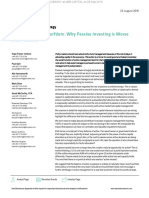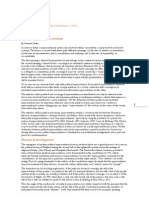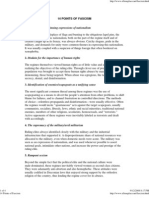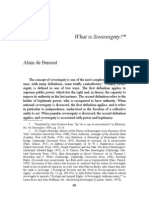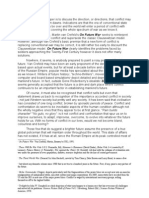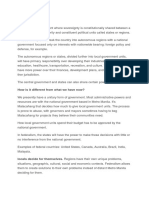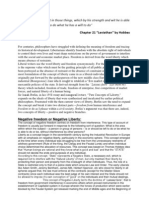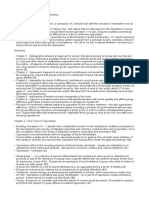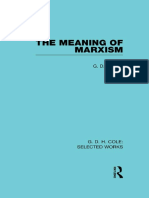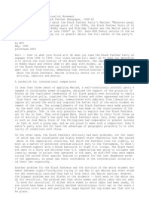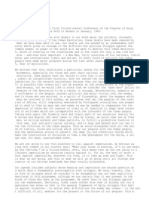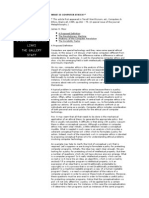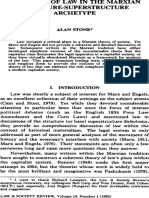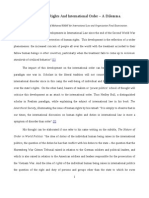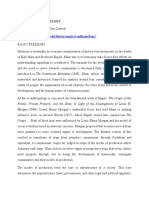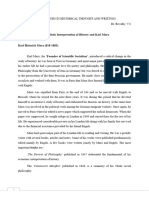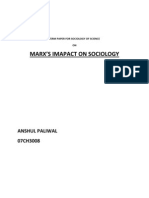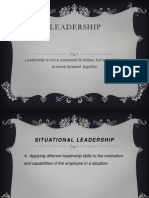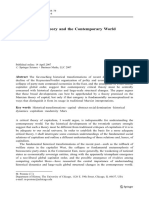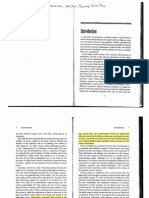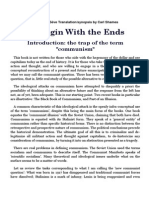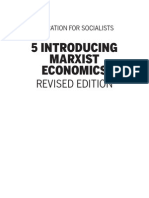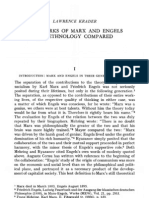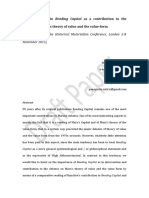Marxist Anthropology
Marxist Anthropology
Uploaded by
Ayaz AliCopyright:
Available Formats
Marxist Anthropology
Marxist Anthropology
Uploaded by
Ayaz AliCopyright
Available Formats
Share this document
Did you find this document useful?
Is this content inappropriate?
Copyright:
Available Formats
Marxist Anthropology
Marxist Anthropology
Uploaded by
Ayaz AliCopyright:
Available Formats
Marxist Anthropology
Sarah Morrow and Robert Lusteck
(Note: authorship is arranged stratigraphically with the most recent author listed first)
Basic Premises:
Marxism is essentially an economic interpretation of history based primarily on the works of Karl Marx and Frederich Engels. Marx was a revolutionary who focused his efforts on understanding capitalism to overthrow it. The rationale for the development of capitalism and the need to move towards communism is developed fully in Capital (1867), but introduced in The Communist Manifesto (1848). Marx, whose orientation was largely materialist and historicist, framed his analysis around four central points: the physical reality of people, the organization of social relations, the value of the historical context of development, and the human nature of continuous praxis. As far as anthropology is concerned, the foundational work is Engels' The Origin of the Family, Private Property, and the State: In Light of the Investigations of Lewis H. Morgan (1884). Lewis Henry Morgans materialist focus had lead Marx to making extensive notes on Ancient Society (1877), which Engels would later expand into The Origin. Both of these men were influenced by Louis Henry Morgan and his model of social evolution based on material concerns. Morgan proposed that societies moved from more primitive to more civilized stages of development. The Marxist version of this resulted in transitions of stage from primitive communism, through feudalism and capitalism, to communism; stages are judged in terms of the modes of production which dominate each stage. Marx did not see these stages as progressive steps that every culture must progress through, but as being the development of historically contingent communities and their modes of production. The modes of production form the base or infrastructure of a society. This base determines the superstructure (laws, governments, and other legal and political apparati), and both determine the ideology (including philosophies, religions, and the ideals which prevail in a society at any one time). Class struggle is the prime mover for such a system to advance stages. It is inevitable that change will occur and that the classes will realign themselves. However the ruling classes have a vested interest in maintaining their power and will seek to resist such change, though futilely in the long run, by whatever means they can. A key tool of the ruling classes is the elaboration of mystification in ideology, which results in the false consciousness of the lower class. Social evolution can be slowed, but not stopped.
Points of Reaction:
Marxist anthropology came about through the works of Marx and Engels and their followers. It developed as a critique and alternative to the domination of Euro-American capitalism and Eurocentric views in the social sciences. Marx was heavily influenced by extensive reading of Classical and Enlightenment era philosophers. Epicurean thought, which focused on the agency
of the individual, the absence of a divine power, and the importance of contingency over teleology, was pervasive in Marxs writing, including his dissertation work. Rousseaus emphasis on history as being a self-correcting tool to validate or contradict the statements of politicians clearly influences Marxs understanding of the connection between the structure and the mode of production. Hegels work, which had the most significant impact on Marx, illustrated the community (while Kant illustrated the individual) and its role in the historically contingent realities in which it exists. Marx would spend much of his career drawing from and critiquing Hegel. The emphasis on the ability of humans to produce social change, the contradictory relationships of power, and the need for systematic investigation into the nature of social problems was very influential to Marx (see Hegels Phenomenology of Spirit from 1807). However, Hegel advocated a teleological approach to social change that Marx would reject through his later works. When Darwin posited his theory of Natural Selection in The Origin of Species (1859), Marx took the argument to be self-evident and intuitive to his understanding of both the natural world and humanity's role within it.
Leading Figures:
Marx, Karl (1818-1883) Marx is often called the most successful social scientist of all time. Born in 1818, Marx lived during a period that allowed him to document the ways in which capitalism and the rise of industry influenced class structures. As a Jewish born Prussian, Marx experienced social divisions from an early age, despite his family being of notable wealth. His time at the University of Bonn and the University of Berlin would lead him to explore philosophical inquires relating to the emancipation of man from religious and political structures. Drawing from Hegel, Marx was an advocate of understanding economic and political changes as a historically contingent dialectic. His Hegelian idealism would diminish over the course of his writings and he would begin to approach his work with a more systematic, scientific approach. The emphasis on understanding these changes through material concerns would lead Marx to identify production as being at the heart of class differences. By looking at capitalism in a holistic fashion, Marx developed a theory of change based around the need for social classes to become equal as the modes and relations of production changed. Marx emphasized that the central component of the worker's revolution was not philosophical concerns, but action. Through analysis of failed revolutions, successful revolutions, and nations on the verge of revolution, Marx believed that the criteria for a successful communist nation could be discerned. In the process, he developed a set of economic structures and their progressive development. His life was marked by constant pressure from various governments across Europe, multiple expulsions from European countries, and a strong family connection to social movements. Without a doubt, he was one of the first true social scientists and, standing alongside Durkheim and Webber, one of the most influential social scientists in history. Engels, Friedrich(1820-1895) Marx's colleague and friend who aided Marx in the establishment of his theories on society and continued to work on Marxist ideas after Marx's death. Engels experienced the plight of English workers through the eyes of a young industrialist. His unique perspective, published in his first major work The Condition of the Working Class in England in 1844 (1844), allowed him to define the working-class as the origin of social action. Engels orientation allowed him to connect heavily with Karl Marx. The two philosophers would go on to write together until Marxs death in 1883. Engels then went on to edit and reevaluate Marxs
notes for futher publication. Engels is often seen as the scapegoat for the failure of the Soviet Union and other such manifestations of communism due to his emphasis on hierarchy. This does not seem to be a fair assessment. Engels and Marx wrote collaboratively, so dividing the work as belonging to solely one or the other is a difficult task. Bloch, Maurice (1939- ) Bloch is a British anthropologist and a well-known defender of French Marxism and Marxist anthropology. He is often noted as a key figure in the introduction of the revival of French Marxism to British Social Anthropology. Ideology, cognition, and language have been at the center of Blochs work. These are seen as indicators of the differential distribution of power within a structured system. Wolf, Eric (1923-1999) He was a Marxist who proposed three modes of production in his prominent work Europe and the People Without History (1982): capitalist, tributary, and kinordered. Wolf was a significant figure in the field of Anthropology. As a student of Julian Steward, Wolf was exposed to Marxism early in his academic career. Wolf would go on to critique Western history for over emphasizing the role of aristocratic figures and underplaying the history and dynamic nature of non Western and subordinate cultures. The academic divisions within the social sciences was evaluated as being a false division, as well, that denied the complexity of humanity. In this sense, Wolf saw Marx as being a true anthropologist by evaluating capitalism in a holistic sense. Gramsci, Antonio(1891-1937) One of the leading figures in Marxism prior to World War II and an Italian communist who formulated the idea of hegemony. He is considered one of the greatest Marixst philosophers of the 20th Century. Gramsci saw human history as being key to the Marxist agenda of social change and that nature only mattered to the point that it interacted with mankind. Here, Gramsci divided the materialist concerns of traditional Marxism from his own socialist theories. The concept of cultural hegemony was articulated by Gramsci in order to explain why the revolution had not occurred. Gramsci was imprisoned for his ideas during Mussolinis reign and died in a prison hospital. Althusser, Louis (1918-1990) The neo-Marxists major source of inspiration in the 1960's, who took a structuralist approach to Marxism. Althusser was known for taking a critical stance on the French Marxist School and the Structural Marxist School, but selectively utilizing key theory points from both schools in order to address Marxism in economics. Althussers career was marked by mental illness and the murder of his wife. Godelier, Maurice (1934- ) A French Marxist and proponent of economic anthropology. Godelier is a strong advocate of anthropology incorporating Marxist theory with a Structuralist bent. His work focused on understanding what modes of production, superstructure, and infrastructure would look like for non Western cultures. Critics of this French Marxism claimed that Godelier tried to force a capital structure onto the history of non Western peoples who had not been capitalist societies before contact with the West.
Key Works:
The Communist Manifesto (1848) -- The best known of Marx and Engels' works and one of the most eloquent calls to action ever published. The Communist Manifesto lays out Marxism's basic economic theories, shows the basic struggle between classes, and recommends action against the 'specter' of capitalism. Das Kapital or Capital (1867) --One of Marx's most complete and mature works, the aim of Capitol is to show how the capitalist system is exploitative in that it "transfers the fruit of the work of the majority...to a minority" and questions why this condition continues. Marx's solution to this problem is ideology, which blinds the workers to the truth of their plight. Ancient Society (1877) -- In this anthropological classic, Lewis Henry Morgan takes a Social Evolution approach to understanding changes in material culture. This would become a deeply influential text to Marx and Engels as it verified the central role that material goods play in developing a centralized economy and the subsequent emphasis that emerges on private property. This work would become the basis for Engels' The Origin... The Origin of the Family, Private Property and the State (1884) --Engels most influential work in anthropology, it presents the evolution of humankind from primitive communism, to slavery, feudalism, capitalism, and finally, industrial communism which would transcend the classes of the prior three stages. The Evolution of Culture (1959) -- Leslie White develops his argument about the nature of culture and the role that material culture plays in this classic text. Here, White articulates his grand theory about the ways that the technological aspects of culture create the structural aspects of culture, which in turn create the ideological aspects of culture. This is a clearly Marxist understanding of culture as material. It is aimed at the technological sphere with the understanding that demystification at the level of the ideological sphere can only occur with a clear understanding of the impact of the technology on individuals. The value of labor is articulated here as the physical energy of the individual. Perspectives in Marxist Anthropology (1973) -- This collection of essays by Maurice Godelier investigates the potential applications of a Marxist analysis to precapitalist cultures. By looking at economic systems as historically contingent with the modes of production, Godelier saw the aspects of culture and society that related to economic change as multifunctional traits. These traits shifted in response to the needs of the developing economy and must be studied as scientific objects. This is then applied to what had been called "primitive" cultures. The Modern World-System Vols I-IV (beginning in 1974) -- In this series, Wallerstein charts the origins of the world system. World Systems theory proposes interconnectivity between nations in the form of some locations being at the center of the line of production (core), while others are more peripheral (periphery or semi-periphery). Wallerstein relates this global movement to the capitalist emphasis on production and the historical contingency of where and when capitalism enters peripheral locations. This shift usually occurred in response to power differentials between classes and Western/non-Western cultures. Here, the system itself is the focus of analysis, not the components.
Europe and the People Without History (1982) -- Wolf's influential critique of Western scholarship focuses on the power roles that have become ingrained in social science discourse and the lack of focus on unwritten history. While focusing on the relevant modes of production, Wolf notes that the image of cultures without written records as being unchanging before contact with European powers is detrimental. This exoticization of the other robs cultures of their history and active hand in their own development. Wolf also advocates for a more holistic, interdisciplinary approach to understanding the ever spreading reach of capitalism. Sweetness and Power: The Place of Sugar in Modern History (1986) -- Sidney Mintz reviews the history of sugar as a commodity over the last 1000 years with an emphasis on the role of labor and production. Mintz argues that "sweetness" has had a strong influence on the historical development of power relations and exchange. By focusing on sugar and its holistic relationship with society, Mintz successfully argues the Marxist ideal of an integrated approach. Critical Medical Anthropology (1995) -- Merrill Singer and Hans Baer investigate the ways in which medical systems mirror power differentials in social classes. By looking at the intersection of the individual, economic forces, and political systems, Singer and Baer argue that current medical practices are indicative of an exchange of goods. Critical medical anthropology focuses on these violations of human rights through a careful analysis of the political economy of health disparities.
Principal Concepts:
Dialectical Materialism This is the philosophical school of Marxism. A focus on the dialectical relationship between the historical contingency of the structure, the material production, and the community is at the center of this theoretical model. Base and SuperstructureThe base consists of the forces and relations of power that are influential to the community. The superstructure is the political, economic, and legal organization of the structure. Standing beside this superstructure is the ideological structure. This system is often cited as a flaw in Marxism and seen as a kind of political economy determinism. LaborThis is productive labor, that work which is needed to sustain production and go beyond the level of the immediate producer. Labor is the sum of the work of the individual through the means of labor and the subject of labor. Labor disappears in the product, as the result is the value. Means of Production The means of production include both the technology or tools with which production is being completed (means of labor) and the raw materials that are being transformed during production (subject of labor). Forces of Production The things we use to produce what we need, including the means of production and labor (including both physical and mental capacities). Meaning this is the
combination of the power of labor, the technology of tools used, and the raw materials being converted. Relations of Production The relationships that individuals are forced to develop to survive within a capitalist driven system and to produce and reproduce their means. These relationships vary between the individuals of the bourgeoisie and the proletariat. Control of the relations of production comes from ownership of the means of production. They also exist between the individual and the forces of their economic connections (i.e., the connection of the bourgeoisie to capital). Mode of Production The way in which all required aspects of everyday life are produced. The mode of production is dictated by the relations of production and the forces of production. The forces of production determine the general mode of production, but only within the confines of the relations of production. When the relations of production conflict with the forces of production, change must occur to the mode of production. This forced change usually happens when the forces of production advance beyond the locus of control for the current version of the relations of production, i.e., a class struggle will occur in response to a disconnection between relation and force. This will continue until the mode of production meets the needs of both. Immediate Producer The immediate producers are those who produce what they themselves consume and more/surplus. The surplus production is that which is in excess of the immediate producer's consumption. The product is never the property of the producer, however. The product is the property of the capitalist. ClassClasses are groups consisting of those individuals who share means of production to the forces of production. Class divides societies because some possess the relations of production through ownership of the means of production and some do not. The rise of private property and the state is the source of these class distinctions. Dialectical materialism states that these class distinctions lead to social solidarity through a collective consciousness. CommunismCommunism is a classless society in which individuals control their own labor through a shared structure of general production, there is no private property (beyond personal affects), and all hold in common the means of production.
Methodologies:
Marx did not leave a clear methodological framework for his philosophy. One of the basic methods of Marxist anthropology is to try to find classes in societies around the world, and examine the ways in which they interact. Marx, himself, focused on this kind of ethnographic research by developing individual case studies. When a political order based on class is found which seems to lack class conflict, special attention is paid. Attention has also been paid to the ways in which cultures resist the spread of capitalism. It has often been felt that Marxism is particularly suited to ferreting out the hidden resistance present in religion and ideology. Marxism is of course dedicated to examining the modes of production present in any society, and there may be more than one present. The dialectical method is also an important concept in
Marxism, which is built on the examination of contradictions between classes, ideas, etc.. When well-applied, the Marxist framework can be used to examine the developments of some societies at various scales. However, there is no one unifying method or vision in Marxism. This is complicated by discussions of "Marxist", "Marxian", and "Marxism" as differing concepts (Maquet, 1984).
Accomplishments:
Marxism formed the basis for the anthropologies, and indeed, the governments, of both China and the Soviet Union/Russia. The idea that the most successful groups seeking a communist life would be societies with a peasant class capable of understanding the benefits of sharing resources fit well here. The peasant class of Russia was seen by Marx as the ideal breeding ground for communism. However, the resulting Soviet Union may not have been what Marx had in mind. In Europe and North America, it was highly unpopular to be associated with Marxism until well after World War II. The works of other anthropologists, like Boas and Malinowski, made it further "unfashionable" to be associated with such ideas. Materialist concerns were not popular with the Boasians, nor was Marxism an acceptable orientation due to the implications relating to Communism (in the USSR sense). The impact of being labeled red kept many Western Marxist anthropologists in the closet until after the end of McCarthyism. Marxism in anthropology has served to raise a number of questions in anthropological reasoning. It has resulted in several other approaches in anthropology, including cultural materialism and cultural ecology. The flag of Marxism was carried by Leslie White (1900-1975) when he focused American Cultural Materialism on the technological sphere of cultures and its influence on the creation of the structure and the ideology of cultures. In other words, White identified the mode of production, its relation of production, and the ways in which the dominant powers utilize mystification to control production and labor (Peace, 2004). Cultural Ecology was championed by Julian Steward (1902-1972). Steward looked at the material concerns of mankind in relation to the environment. Marx had always made a point of noting that humans are a part of the natural world. With this in mind, Steward looked at the connections between environment and possible modes of production. It has also added to the efforts of feminist anthropology and has had a number of influences on archaeology, an essentially materialist endeavor. Feminist Post-Marxism is drawn on heavily by Judith Butler (1956-). Here, Feminist and Queer Anthropology see the linguistic differentiation between genders as an example of a power struggle imposed by structure. Butler extrapolates further to indicate that utilizing this kind of language is a performance act, per Marxs ideas of recreation of social structure in everyday encounters and Michel Foucaults subjugation theory. The link between gender, sexuality, language, and class power has also been explored by Sally McConnell-Ginet. Her analysis of the impact of diagnostic terminology and terminology of social solidarity in gender and sexuality indicates that dominate class views are deeply pervasive in language (McConnell-Ginet, 2002). The French Marxist school of thought brought together Marxist philosophy, Levi-Strauss Structuralism, and what would become known as Post Modernism. The post WWII developments included the Existentialist Marxism of Jean Paul Sartre (1905-1980), the
rejection of total history by Michel Foucault (1926-1984), and the Structural Marxism of Althusser. French Marxism collapsed after the protests of 1968 and the failure of the revolution. In recent years, Marxism has been evaluated as being something of a pass model for theory and has been overlooked in many areas. Anthropology, however, has maintained an air of Marxism due to the tendency for anthropologists to maintain a social justice orientation. NeoMarxism has become more pervasive under the name of Political Economy. Contemporary Political Economy focuses on the tangible disparities between differing socioeconomic groups due to political influences. The works of Wolf, Andre Gunder Frank (1929-2005), Immanuel Wallerstein (1930 - ), and the more recent work of Noam Chomsky (1928 - ) all relate to Political Economy and Hegemony, while selectively pulling from Marx and Gramsci. Since the publication of Building a New Biocultural Synthesis: Political-Economic Perspectives on Human Biology (Goodman & Leatherman, 1998), the connections between class disparities, health statuses, and access to resources have been clear to applied biocultural anthropologists. The political economy of language has become a notable area of inquiry, including the ways in which language is a tool for economic exchange (Irvine, 1989). The lasting legacy of Marx is this increased awareness of the broader impact of class structures.
Criticisms:
One of the main criticisms of Marxism is that it is not particularly anthropological in nature, not being interested in culture and ethnography. Marx, however, completed many case studies on the successes and failures of specific cultures and social groups in creating his philosophy When anthropologists did apply it in a more anthropological framework, it looked less and less like Marxism. Marxism has been restricted by its inability "to deal with culture as a distinct and irreducible order of signs and meanings". One criticism of Marxists themselves is that they have often "built their work on unacknowledged Marxist assumptions about the importance of class and inequality in social life without properly confronting either the strengths or the weaknesses of Marxist theory". A major criticism is that Marxism has no particular unified aim or method; many Marxists argue more among themselves than with other theorists. Marxism has also been criticized on its definition of ideology which puts it forth as a plot created by the ruling class to mystify the lower class. Further, how the ideology spreads is also unclear. Another problem that Marxism has faced is in the evaluation of societies that do not possess any classes; how and why did 'primitive communism' change without a conflict of classes? In many societies, kinship, religion, and ethnicity seem to have provided stronger connections than has class. When viewed independently, this critique makes sense. No aspect of culture operates in isolation, however, meaning that aspects such as kinship, religion, and ethnicity can be aspects of class within a culture. Other terms in Marxism have also been criticized, such as the labor theory of value, which states that the value of work is the cost of materials and labor involved, a definition which assumes voluntary cooperation of laborers and does not include management costs and responsibilities. Today, Marxism is criticized for overemphasizing the reach of capitalism. It is still debated as to whether or not capitalism has truly had a pervasive impact on society.
Comments:
Marxism has taken many forms other than those originally outlined by Marx and Engels; communism has as well. Within Marxs lifetime, he was presented with his own name being used as a popular catchall for radical view points. It is said that Marx declared if this is Marxism, then I am not a Marxist in a personal communication concerning the French political party divisions. Much of the criticism of Marxism today is related to the vastly different versions of Marxism that have proliferated and assumptions about what he did and did not intend.
Sources and Bibliography:
Amselle, Jean-Loup. Anthropology and Historicity. History & Theory, 32(4), 12. 1993. Bloch, Maurice, ed. Marxist Analyses and Social Anthropology. New York: Wiley, 1975. Bloch, Maurice. Marxism and Anthropology: The History of a Relationship. Oxford: Clarendon Press, 1983. Borofsky, Robert, ed. Assessing Cultural Anthropology. New York: McGraw-Hill, Inc., 1994. Darwin, Charles. On the Origin of Species. 1859. Donham, Donald L. History, Power, Ideology: Central Issues in Marxism and Anthropology. Cambridge:Cambridge University Press, 1990. Elardo, Justin A. Marx, Marxists, and Economic Anthropology. Radical Political Economics, 39(3), 416-422. 2007. Engels, Friedrich. The Condition of the Working Class in England in 1844. 1844. Engels, Friedrich. The Origin of the Family, Private Property and the State. 1884. Foley, Douglas. The Rise of Class Culture Theory in Educational Anthropology. Anthropology & Education Quarterly, 41(3), 215-227. 2010. Fluehr-Lobban, Carolyn, ed. International Perspectives on Marxist Anthropology. Minneapolis:MEP Publications, 1989. Gellner, Ernest, ed. Soviet and Western Anthropology: with an introduction by Meyer Fortes. New York; Columbia University Press, 1980. Godelier, Maurice. Perspectives in Marxist Anthropology. Cambridge: Cambridge University Press, 1978. Goldstein, Philip. Post-Marxist Theory: An Introduction. Albany: State University of New York Press, 2005. Goodman, Alan H. and Leatherman, Thomas. Building a New Biocultural Synthesis: Perspectives on Human Biology. Ann Arbor: University of Michigan Press, 1998. Hakken, David and Lessinger, Hanna, eds. Perspectives in U.S. Marxist Anthropology. Boulder: Westview Press, 1987. Harris, Marvin. Theoretical Principles of Cultural Materialism. In High Points in Anthropology. Bohannan, Paul and Glazer, Mark, eds. New York: McGraw-Hill, Inc., 1988. Haslett, Moyra. Marxist Literary and Cultural Theories. New York; St. Martins Press, 2000. Hegel, Georg Wilhelm Friedrich. Phenomenology of Spirit. 1807. Hodder, Ian. Theory and Practice in Archaeology. London: Routledge, 1992. Ingold, Tim, ed. Companion Encyclopedia of Anthropology. London: Routledge, 1994. Irvine, Judith. When talk isn't cheap: Language and political economy. American Ethnologist 16(2): 248-67, 1989.
Kautsky, John H., ed. Karl Kautsky and the Social Science of Classical Marxism. Leiden, The Netherlands:E. J. Brill, 1989. Lem, Winnie and Leach, Belinds, eds. Culture, Economy, Power: Anthropology as Critique, Anthropology as Praxis. State University of New York Press, 2002. Marcus, Anthony. The Culture of Poverty Revisited: Bringing Back the Working Class. Anthropologica, 47(1), 35-52. 2005. Marcus, Anthony and Menzies, Charles. Towards a Class-Struggle Anthropology. Anthropologica, 47(1), 13-33. 2005. Marx, Karl. Capital. Trans. Ben Fowkes. London: Penguin Books, (1990) 1867. Marx, Karl and Engels, Friedrich. The Communist Manifest. 1848. McConnell-Ginet, Sally. Queering semantics: Definitional struggles in, Language and Sexuality, Contesting Meaning in Theory and Practice, Palo Alto: CSLI. 137-160, 2002. Mintz, Sidney, Godelier, Maurice, and Trigger, Bruce. On Marxian Perspectives in Anthropology: Essays in Honor of Harry Hoijer 1981, Introduction by Jacues Maquet. Malibu: Undena Publications, 1984. Mintz, Sidney. Sweetness and Power: The Place of Sugar in Modern History. New York: Penguin, 1986. Morgan, Lewis Henry. Ancient Society. 1877. Nelson, Cary and Grossberg, Lawrence, eds. Marxism and the Interpretation of Culture. Urbana:University of Illinois Press, 1988. OLaughlin, Bridget. Marxist Approaches in Anthropology. Annual Review of Anthropology, 4, 341-370. 1975. Ollman, Bertell, and Vernoff, Edward, eds. The Left Academy: Marxist Scholarship on American Campuses, vol. 1. New York: McGraw-Hill Book Company, 1982. Ollman, Bertell, and Vernoff, Edward, eds. The Left Academy: Marxist Scholarship on American Campuses, vol. 2. New York: Praeger Publishers, 1984. Patterson, Thomas Carl. Karl Marx, Anthropologist. New York: Berg, 2009. Peace, William J. Leslie A. White: Evolution and Revolution in Anthropology. Lincoln: University of Nebraska Press, 2004. Price, David H. Threatening Anthropology : McCarthyism and the FBI's Surveillance of Activist Anthropologists. Durham: Duke University Press, 2004. Roseberry, William. Political Economy. Annual Review of Anthropology, 17, 161-185. 1988. Roseberry, William. Marx and Anthropology. Annual Review of Anthropology, 26(1), 25. 1997. Sayre, Nathan F. Assessing the Effects of Grundisse in Anglophone Geography and Anthropology. Antipode, 40(5). 2008. Seddon, David, ed. Relations of Production: Marxist Approach to Economic Anthropology. Trans by Helen Lackner. London: Cass, 1978. Seed, John. Marx, A Guide for the Perplexed. London: Continuum International Publishing Group, 2010. Singer, Merrill and Baer, Hand. Critical Medical Anthropology. Baywood Publishing Co., Inc. 1995. Terray, Emmanuel. Marxism and "Primitive" Societies. New York: Monthly Review Press, 1972.
Trigger, Bruce G. A History of Archaeological Thought. Cambridge: Cambridge University Press, 1989. Vincent, Joan. Anthropology and Politics: Visions, Traditions, and Trends. Tucson: The University of Arizona Press, 1990. Wallerstein, Immanuel. The Modern World-System I. University of California Press. 1974. Wallerstein, Immanuel. The Modern World-System II. University of California Press. 1980. Wallerstein, Immanuel. The Modern World-System III. University of California Press. 1989. Wallerstein, Immanuel. The Modern World-System IV. University of California Press. 2011. Ward Gailery, Christine, ed. Dialectical Anthropology: Essays in Honor of Stanley Diamond. Gainsville; University Press of Florida, 1992. Wenke, Robert J. Patterns in Prehistory. New York: Oxford University Press, 1990. White, Leslie A. The Evolution of Culture. Left Coast Press, (2007) 1959. Wolf, Eric. Peasant Wars of the Twentieth Century. New York: Harper & Row, 1969. Wolf, Eric. Europe and the People Without History. Berkley:University of California Press, 1982. Yelvington, Kevin A. The Making of a Marxist-Feminist-Latin Americanist Anthropologist: An Interview with Helen I. Safa. Caribbean Studies, 38(2), 3-32. 2010.
Relevant Web Links:
The basics of Marxism Marxists Internet Archives The Communist Manifesto on Project Gutenberg The Origin of the Family, Private Property and the State on Project Gutenberg Ancient Society on Google Books The Evolution of Culture on Google Books Open Anthropology Cooperative thread on NeoMarxism; started by Phillip Carl Salzman Authors click here for password protected editing form Administrator click here to add authors
You might also like
- Bernstein Passive Investing Serfdom Aug 2016Document47 pagesBernstein Passive Investing Serfdom Aug 2016icefarmcapital100% (3)
- Narrative TechniquesDocument4 pagesNarrative TechniquesAyaz Ali100% (2)
- Global SolidarityDocument10 pagesGlobal SolidarityDäv OhNo ratings yet
- Sartori, Representation in International Encyclopedia of The Social SciencesDocument10 pagesSartori, Representation in International Encyclopedia of The Social SciencesAdriano CodatoNo ratings yet
- 14 Points of FascismDocument4 pages14 Points of FascismfinklesteinNo ratings yet
- Marxist CriminologyDocument15 pagesMarxist CriminologyPerry Mag100% (1)
- Credo of A ReactionaryDocument9 pagesCredo of A ReactionaryCesar Felix Sanchez100% (1)
- Political Ideas and Ideologies: Chapter 2, Heywood's Politics, 4th EditionDocument23 pagesPolitical Ideas and Ideologies: Chapter 2, Heywood's Politics, 4th EditionDo KyungsoooooNo ratings yet
- POLSC101 OC 1 - 1 Introduction To Political Science FINAL PDFDocument4 pagesPOLSC101 OC 1 - 1 Introduction To Political Science FINAL PDFjagjivanNo ratings yet
- Kellner, Douglas 2005 'Western Marxism' in Austin Harrington 2005 'Modern Social Theory - An Introduction' (Pp. 154 - 174)Document26 pagesKellner, Douglas 2005 'Western Marxism' in Austin Harrington 2005 'Modern Social Theory - An Introduction' (Pp. 154 - 174)voxpop88No ratings yet
- Marx, Karl - Fraser, Ian - Marx, Karl - Wilde, Lawrence - Marx DictionaryDocument232 pagesMarx, Karl - Fraser, Ian - Marx, Karl - Wilde, Lawrence - Marx DictionaryLeonardo Ferreira Guimaraes100% (4)
- Marx's Précis of Hegel's Doctrine On Being in The Minor Logic - Joseph O'Malley - Fred E. Schrader PDFDocument6 pagesMarx's Précis of Hegel's Doctrine On Being in The Minor Logic - Joseph O'Malley - Fred E. Schrader PDFHyury PinheiroNo ratings yet
- F-2018 Hirsch-State Theory-Vn4Document22 pagesF-2018 Hirsch-State Theory-Vn4soardjNo ratings yet
- Rethinking Civil Disobedience As A PractDocument9 pagesRethinking Civil Disobedience As A PractSebastian LeonNo ratings yet
- Insurrectionalist Anarchism Part OneDocument30 pagesInsurrectionalist Anarchism Part OneRebel MouseNo ratings yet
- Fundamental RightsDocument4 pagesFundamental Rightskriti bhatnagarNo ratings yet
- AmericasDocument380 pagesAmericasDanaila VioletaNo ratings yet
- What Is SovereigntyDocument20 pagesWhat Is Sovereigntysurraj1438No ratings yet
- Woodrow Wilson On Socialism and DemocracyDocument5 pagesWoodrow Wilson On Socialism and DemocracyJohn MalcolmNo ratings yet
- State and Its Functions 21092020 042233pmDocument29 pagesState and Its Functions 21092020 042233pmkaykaytNo ratings yet
- Culture and ImperialismDocument5 pagesCulture and ImperialismspeakingsocietyNo ratings yet
- Youth (Unrest)Document13 pagesYouth (Unrest)Intikhab Ahmad100% (1)
- Future War - 1995Document21 pagesFuture War - 1995Simon O'NeillNo ratings yet
- Sovereignty: Assistant Professor Hidayatullah National Law University Raipur, ChhattisgarhDocument15 pagesSovereignty: Assistant Professor Hidayatullah National Law University Raipur, ChhattisgarhOnindya MitraNo ratings yet
- What Is FederalismDocument4 pagesWhat Is FederalismRidzsr DharhaidherNo ratings yet
- LibertyDocument3 pagesLibertyHakim AfzalNo ratings yet
- Marx Perspective of StateDocument4 pagesMarx Perspective of StateDR MEENUNo ratings yet
- Justice and The Politics of DifferenceDocument3 pagesJustice and The Politics of DifferenceS100% (1)
- Lectura Sovereignty As Symbolic FormDocument145 pagesLectura Sovereignty As Symbolic FormNatalia Muñoz100% (1)
- Armed Struggle in Italy Book Revised2009Document60 pagesArmed Struggle in Italy Book Revised2009Victoria ViñalsNo ratings yet
- GDH Cole The Meaning of MarxismDocument53 pagesGDH Cole The Meaning of MarxismSociedade Sem HinoNo ratings yet
- Hegemony PDFDocument4 pagesHegemony PDFSiddhant MathurNo ratings yet
- Andre Gunder Frank and Martha Fuentes Nine Theses On Social MovementDocument8 pagesAndre Gunder Frank and Martha Fuentes Nine Theses On Social MovementVasilije LuzaicNo ratings yet
- DemocracyDocument1 pageDemocracyapi-529624932No ratings yet
- Maoism Restored: The Black Panther Newspaper, 1968-69Document9 pagesMaoism Restored: The Black Panther Newspaper, 1968-69Mosi Ngozi (fka) james harrisNo ratings yet
- Karl Marx and Theories of PersonalityDocument3 pagesKarl Marx and Theories of PersonalityShubham Jain ModiNo ratings yet
- The Weapon of TheoryDocument12 pagesThe Weapon of TheoryMosi Ngozi (fka) james harrisNo ratings yet
- Cyclical Theory of ChanceDocument1 pageCyclical Theory of ChanceRA MamhotNo ratings yet
- AnarchismDocument37 pagesAnarchismIvankohlNo ratings yet
- Slavery, Capitalism, and Politics in The Antebellum Republic. Volume 1, Commerce and Compromise, 1820-1850Document532 pagesSlavery, Capitalism, and Politics in The Antebellum Republic. Volume 1, Commerce and Compromise, 1820-1850Damian HemmingsNo ratings yet
- The Origin OF Frankurt School: Calabuga & IdongDocument8 pagesThe Origin OF Frankurt School: Calabuga & IdongHiraiNo ratings yet
- Gary Allen - Nixon - The Man Behind The MaskDocument202 pagesGary Allen - Nixon - The Man Behind The MaskDaniela Raffo100% (2)
- Do or Die Insurrectionary AnarchyDocument23 pagesDo or Die Insurrectionary AnarchyKoutsoupis100% (1)
- The Hobo Anomalous Class Minorities and PDFDocument24 pagesThe Hobo Anomalous Class Minorities and PDFPaul BassoNo ratings yet
- Confronting The Darkness of EnlightenmentDocument5 pagesConfronting The Darkness of Enlightenmentlomaxx21No ratings yet
- Essentail of Valid Contract PresentationDocument19 pagesEssentail of Valid Contract PresentationkaleemshanNo ratings yet
- Public CorporationDocument13 pagesPublic CorporationHira MahvishNo ratings yet
- Marxist TheoryDocument7 pagesMarxist TheoryKartikey SinghNo ratings yet
- Moor - What Is Computer EthicsDocument9 pagesMoor - What Is Computer EthicsfingeorgiNo ratings yet
- No Treason IDocument14 pagesNo Treason IguitsaruNo ratings yet
- Opposition+in+the+Nazi+Regime UnlockedDocument21 pagesOpposition+in+the+Nazi+Regime UnlockedWill TeeceNo ratings yet
- Political Elites & Political LeadersDocument42 pagesPolitical Elites & Political LeadersTaniusha DumbravaNo ratings yet
- Decision-Making in Times of Injustice Lesson 8Document13 pagesDecision-Making in Times of Injustice Lesson 8Facing History and OurselvesNo ratings yet
- Place of Law in The Marxian Structure-Superstructure Archetype, The - Alan Stone PDFDocument28 pagesPlace of Law in The Marxian Structure-Superstructure Archetype, The - Alan Stone PDFOni-sanNo ratings yet
- Viden Io Du Ba Pol SC Hons Notes Neo Realism PDFDocument18 pagesViden Io Du Ba Pol SC Hons Notes Neo Realism PDFSonali Raghuvanshi100% (1)
- Right To Self DeterminationDocument7 pagesRight To Self DeterminationmrudulaNo ratings yet
- Human Rights and International OrderDocument12 pagesHuman Rights and International Orderawanggoneng100% (2)
- Exploring White Supremacy On Social MediaDocument28 pagesExploring White Supremacy On Social MediaRyan BowmanNo ratings yet
- From Riot To InsurrectionDocument24 pagesFrom Riot To InsurrectionjaNo ratings yet
- Alabama. MARXIST ANTHROPOLOGYDocument17 pagesAlabama. MARXIST ANTHROPOLOGYQuốc Nguyễn TrọngNo ratings yet
- Karl MarxDocument4 pagesKarl MarxAdithya KrishnanNo ratings yet
- Karl Marx-Dialectical Materialism & Mode of Production Sent by SirDocument39 pagesKarl Marx-Dialectical Materialism & Mode of Production Sent by SirA Parel DrNo ratings yet
- Term Paper For Sociology of ScienceDocument6 pagesTerm Paper For Sociology of ScienceAnshul_Paliwal_5779No ratings yet
- Marx and DurkheimDocument20 pagesMarx and Durkheimrohitk12No ratings yet
- Economics 100 Quiz 1Document15 pagesEconomics 100 Quiz 1Ayaz AliNo ratings yet
- Lesson 9Document2 pagesLesson 9Ayaz AliNo ratings yet
- Karl Marx Week 5Document35 pagesKarl Marx Week 5Ayaz AliNo ratings yet
- Leadership: Leadership Is Not A Command To Follow, But An Invitation To Move Forward TogetherDocument8 pagesLeadership: Leadership Is Not A Command To Follow, But An Invitation To Move Forward TogetherAyaz AliNo ratings yet
- Perception and Management of Malaria inDocument6 pagesPerception and Management of Malaria inAyaz AliNo ratings yet
- German Socialism As An Alternative To MarxismDocument12 pagesGerman Socialism As An Alternative To Marxism4uk57c100% (1)
- Capital by Karl MaxDocument9 pagesCapital by Karl MaxtezukaNo ratings yet
- Introduction of Economic DevelopmentDocument3 pagesIntroduction of Economic Developmentsyifairbah100% (1)
- Richard B. Day - Discovering Imperialism - Social Democracy To World War IDocument963 pagesRichard B. Day - Discovering Imperialism - Social Democracy To World War IchrlalalaNo ratings yet
- Afterword To The Second German Edition: Karl Marx Capital Volume OneDocument8 pagesAfterword To The Second German Edition: Karl Marx Capital Volume OneDaniel RudinNo ratings yet
- Critical Social Theory and The Contemporary World: Int J Polit Cult Soc (2005) 19:69 - 79 DOI 10.1007/s10767-007-9012-6Document11 pagesCritical Social Theory and The Contemporary World: Int J Polit Cult Soc (2005) 19:69 - 79 DOI 10.1007/s10767-007-9012-6Mati GuerraNo ratings yet
- Marx Theory of Primitive AccumulationDocument18 pagesMarx Theory of Primitive AccumulationRendra PermanaNo ratings yet
- AminDocument49 pagesAminkingjameson1No ratings yet
- 3 Sources N 3 Component Parts of Marxism by LeninDocument42 pages3 Sources N 3 Component Parts of Marxism by Lenin5705robinNo ratings yet
- MLM Reading ListDocument3 pagesMLM Reading ListMarlon LesterNo ratings yet
- Ehrbar, Hans G. 2006 Annotations To Karl Marx's 'Capital', Class Edition (1,487 PP.)Document1,487 pagesEhrbar, Hans G. 2006 Annotations To Karl Marx's 'Capital', Class Edition (1,487 PP.)voxpop88No ratings yet
- By Lucien Sève TranslationDocument46 pagesBy Lucien Sève TranslationRedhabAbbassNo ratings yet
- 2009 Rothschild (Workers Cooperatives and Social Enterprise)Document19 pages2009 Rothschild (Workers Cooperatives and Social Enterprise)BazikstanoNo ratings yet
- Why and How To Read Marx's Capital? PDFDocument16 pagesWhy and How To Read Marx's Capital? PDFAnonymous KnNWaY9No ratings yet
- Marx and Darwin: A Reconsideration Author(s) : Terence Ball Reviewed Work(s) : Source: Political Theory, Vol. 7, No. 4 (Nov., 1979), Pp. 469-483 Published By: Stable URL: Accessed: 22/04/2012 07:24Document16 pagesMarx and Darwin: A Reconsideration Author(s) : Terence Ball Reviewed Work(s) : Source: Political Theory, Vol. 7, No. 4 (Nov., 1979), Pp. 469-483 Published By: Stable URL: Accessed: 22/04/2012 07:24AnthriqueNo ratings yet
- Introducing Marxist EconomicsDocument24 pagesIntroducing Marxist Economicspastetable100% (1)
- Full Program Guide 2014-ACLADocument183 pagesFull Program Guide 2014-ACLAAurea SantosNo ratings yet
- Godelier-System Structure Contradiction in Capital PDFDocument29 pagesGodelier-System Structure Contradiction in Capital PDFArrelaro FascinaNo ratings yet
- Micro EconomicDocument71 pagesMicro Economicaccord123No ratings yet
- Abstract Temporality & Marx's Critique of Political EconomyDocument52 pagesAbstract Temporality & Marx's Critique of Political EconomyTom Allen100% (1)
- The Works of Marx and EngelsDocument53 pagesThe Works of Marx and EngelsSubproleNo ratings yet
- Marx, Morality, and The Global Justice DebateDocument16 pagesMarx, Morality, and The Global Justice DebatePablo GresNo ratings yet
- Vol. 3 Iss. 3Document261 pagesVol. 3 Iss. 3Cain MooreNo ratings yet
- Ranciere S Text in Reading Capital As ADocument15 pagesRanciere S Text in Reading Capital As ARade PantićNo ratings yet
- History of Economic ThoughtDocument56 pagesHistory of Economic ThoughthoogggleeeNo ratings yet
- Animal Farm Study Guide (Overview)Document14 pagesAnimal Farm Study Guide (Overview)aliabidi100% (3)
